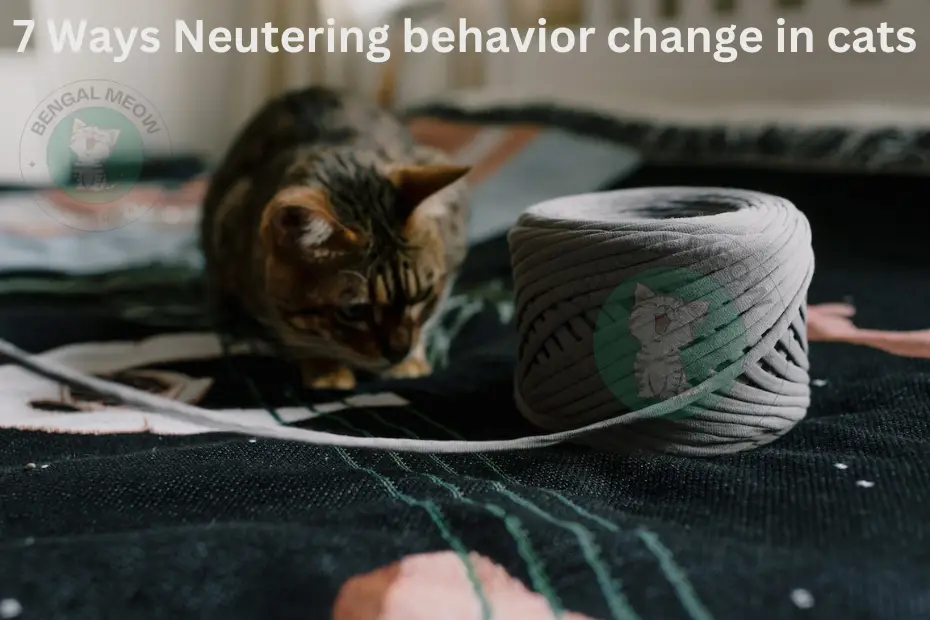7 Neutering Behavior Change in Cats: Understanding Post-Surgery Feline Behavioral Modifications
Neutering behavior change in cats is a significant topic that every cat owner should explore. Neutering, also known as spaying or castration, is a common veterinary procedure that goes beyond controlling the pet population. It plays a crucial role in altering a cat’s behavior, influencing various aspects of their temperament and interactions with both humans and other animals. If you’re a cat owner considering neutering or have already had your feline companion neutered, it’s essential to understand how this procedure can bring about behavioral changes. In this article, we will delve into the transformative effects of neutering on cat behavior, shedding light on what you can expect for your beloved feline friend’s well-being and happiness.
Neutering, also known as spaying (for females) or castration (for males), is a common procedure recommended by veterinarians to control the pet population and improve the overall health of cats. However, beyond its reproductive benefits, neutering can also have a profound impact on a cat’s behavior. If you’re a cat owner considering neutering or have already had your feline companion neutered, it’s essential to understand the behavioral changes that may occur. In this article, we will delve into seven significant ways neutering affects cat behavior and how it can positively influence your furry friend’s life.
7 Ways Neutering behavior change in cats | Understanding Behavioral Changes
Neutering, also known as spaying (for females) or castration (for males), is a common procedure recommended by veterinarians to control the pet population and improve the overall health of cats. However, beyond its reproductive benefits, neutering can also have a profound impact on a cat’s behavior.
Reduced Roaming Tendencies After Neutering:
One of the primary behavioral changes observed after neutering a cat is a decrease in roaming tendencies. Intact male and female cats often have a strong urge to explore their surroundings in search of mates, leading to frequent attempts to escape from home. However, once a cat is neutered, the levels of sex hormones, such as testosterone in males and estrogen in females, significantly drop. As a result, the cat’s motivation to roam and seek potential mates diminishes.
Neutering helps in curbing this instinctual behavior, making your cat more content to stay indoors and reducing the risk of accidents, injuries, or getting lost. Keep in mind that while neutering generally reduces roaming tendencies, it may not completely eliminate the desire to explore entirely, as individual personality traits can also play a role.
Check also: Do Bengal Cats Shed? Everything You Need to Know
Calmer Demeanor in Neutered Cats:
Unaltered cats can display more intense and unpredictable behaviors due to the influence of sex hormones. Male cats, in particular, may exhibit aggressive tendencies, spraying urine to mark territory, and engaging in fights with other males. Female cats can display mood swings and become more vocal during their heat cycles. Neutering can significantly contribute to calming these behaviors.
After the procedure, the reduced hormonal influence can lead to a more stable and mellow demeanor in both male and female cats. They are less likely to engage in aggressive behaviors and are generally more affectionate towards their human companions. A calmer demeanor not only fosters a better relationship between you and your feline friend but also promotes a safer and more harmonious environment for everyone in the household.
Check also: Types of Bengal Cats: A Comprehensive Guide to the Different Varieties
Decreased Urine Spraying in Neutered Male Cats:
Urine spraying is a common behavioral issue in intact male cats. When a male cat sprays urine, it is a way of marking territory and communicating with other cats. The strong smell of sprayed urine can be challenging to remove and may lead to territorial disputes among multiple cats in the same household.
Neutering can significantly reduce urine spraying tendencies in male cats. The decline in testosterone levels eliminates the motivation to mark territory through spraying. In some cases, if the spraying behavior is already well-established before neutering, it may take some time and additional behavioral training to fully eliminate the habit. However, neutering remains an essential step in addressing this behavior and preventing it from becoming a recurring issue.
Check also: Bengal Vs Savannah Cat : Are they Alike? (Similarities & Differences)
Less Aggressive Behavior After Neutering:
Sex hormones can play a significant role in aggression displayed by cats. Intact male cats, in particular, are more prone to aggressive behavior, especially when they perceive a threat to their territory or when competing for a mate. Aggression can also be more prevalent in unspayed females during their heat cycles.
Neutering helps reduce aggressive tendencies by regulating hormone levels. With diminished hormonal influence, your cat is less likely to react aggressively to various triggers. This can create a safer and more peaceful environment for both your cat and other pets or family members in the household.
Check also: Are Bengal Cats Hypoallergenic? Debunking the Myth
Altered Social Interactions in Neutered Cats:
Neutering can bring about changes in how your cat interacts with other animals and humans. Unaltered cats may have more unpredictable social behaviors due to the influence of sex hormones. Some cats might be excessively dominant or territorial, while others could be overly timid or anxious.
After neutering, cats often display more balanced social interactions. They may become more affectionate and friendly towards humans and other pets in the household. However, it’s important to note that individual personality traits still play a significant role in shaping social behaviors. Some cats may become more outgoing, while others may remain reserved even after neutering.
Check also: Unveiling the Melodious Meow of Bengal Cats: A Fascinating Feline Communication
Potential Weight Gain and Neutering:
While not a direct behavioral change, it’s essential to mention that neutering can impact your cat’s metabolism and energy levels, potentially leading to weight gain. Neutered cats often have a reduced metabolic rate, and their activity levels may decrease. As a result, they may require fewer calories than before.
To prevent unwanted weight gain, it’s crucial to monitor your cat’s diet and engage them in regular play and exercise. Obesity can lead to various health issues, including diabetes and joint problems, so maintaining a healthy weight is vital for your cat’s overall well-being.
Check also: Why are Bengal Cats Illegal in NYC? Exploring the Reasons Behind the Ban
Elimination of Heat Cycles in Spayed Female Cats:
For female cats, one of the significant behavioral changes after spaying is the elimination of heat cycles. During a heat cycle, female cats can become extremely vocal, restless, and display an increased desire to escape the house in search of a mate. This behavior can be distressing for both the cat and the owner.
Spaying involves the removal of the ovaries and uterus, which eliminates the hormonal fluctuations associated with heat cycles. After spaying, your female cat will no longer experience heat periods, resulting in a more stable and predictable temperament throughout the year.
Frequently Asked Questions(FAQs)
How does neutering impact a cat’s behavior?
Neutering can significantly influence a cat’s behavior by reducing roaming tendencies, calming aggressive behaviors, and altering social interactions. The procedure involves removing the cat’s reproductive organs, leading to reduced levels of sex hormones that drive certain behaviors. As a result, neutered cats often display a calmer demeanor, decreased urine spraying, and less aggressive tendencies.
When can I expect to see behavioral changes after neutering my cat?
Behavioral changes can vary from cat to cat, but most owners notice significant improvements within a few weeks after the procedure. The cat’s hormone levels gradually decrease, leading to behavioral adjustments. However, it’s essential to remember that individual personality traits also play a role, and some cats may take longer to show behavioral changes.
Will neutering stop my cat from roaming and trying to escape outside?
Neutering can greatly reduce a cat’s urge to roam and escape outside, but it may not eliminate it entirely. The desire to explore the outdoors can be influenced by a cat’s personality and past experiences. While neutering helps in curbing roaming tendencies, it’s crucial to create an enriching indoor environment to keep your cat stimulated and content.
Can neutering help with aggressive behavior in my cat?
Yes, neutering can positively impact aggressive behaviors in cats, particularly in intact males. The decline in sex hormones like testosterone can lead to a reduction in aggressive tendencies. However, it’s essential to address any existing behavioral issues with the guidance of a veterinarian or animal behaviorist, as neutering alone may not completely resolve all forms of aggression.
Will neutering change my cat’s personality?
Neutering typically leads to a more balanced and stable personality in cats. While certain behaviors influenced by sex hormones may diminish, the core personality of the cat usually remains intact. Neutering can enhance the cat’s overall temperament, making them more affectionate, calm, and content companions. However, each cat is unique, and individual personality traits can still shape their behavior even after neutering.
Conclusion:
Neutering can bring about several positive changes in a cat’s behavior, making them better companions and reducing some of the undesirable tendencies associated with intact cats. From reduced roaming tendencies to decreased urine spraying and aggression, neutering plays a significant role in promoting a calmer and more content feline friend. However, it’s crucial to remember that individual personalities can still influence behavior, so each cat’s response to neutering may vary. If you’re considering neutering your cat, consult with a veterinarian to understand the procedure’s potential effects fully. By doing so, you can ensure the best outcome for your beloved feline companion’s health and well-being.





One thought on “7 Neutering Behavior Change in Cats: Understanding Post-Surgery Feline Behavioral Modifications”
Comments are closed.